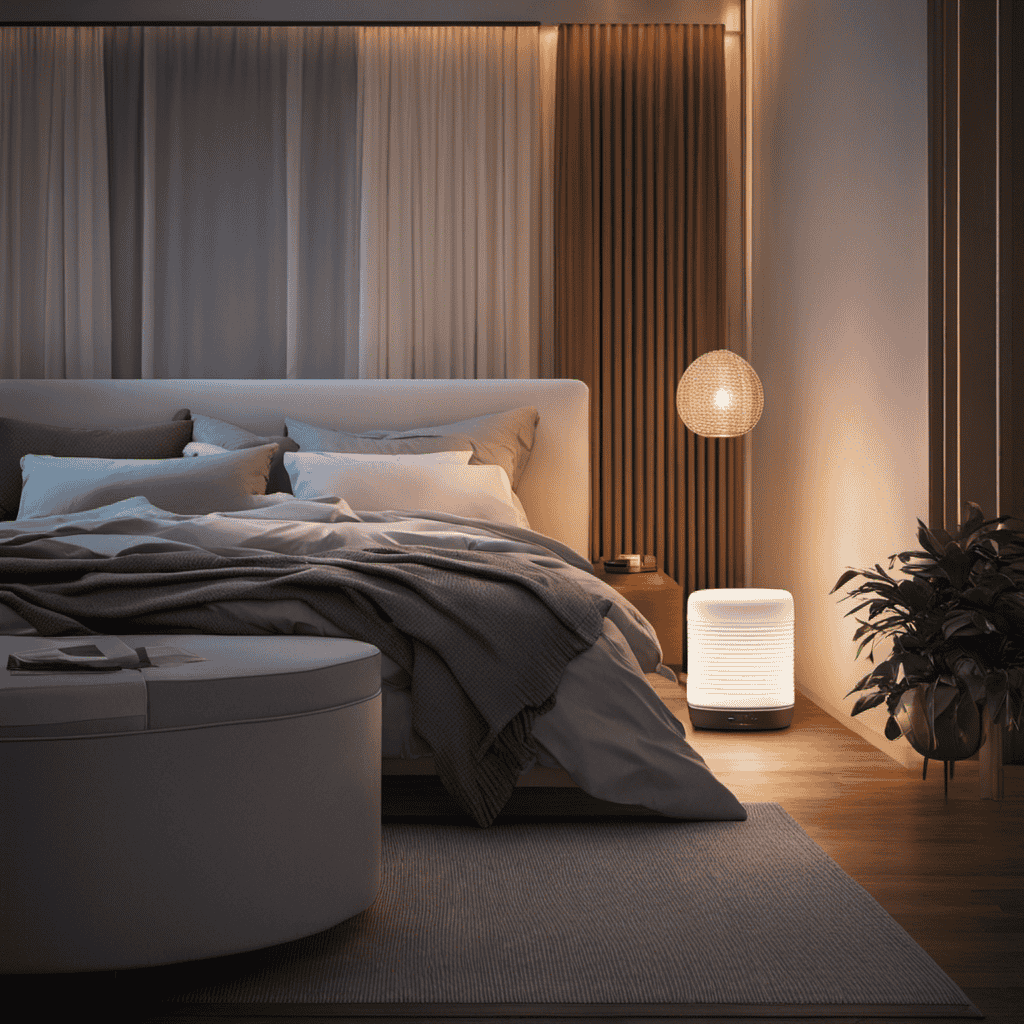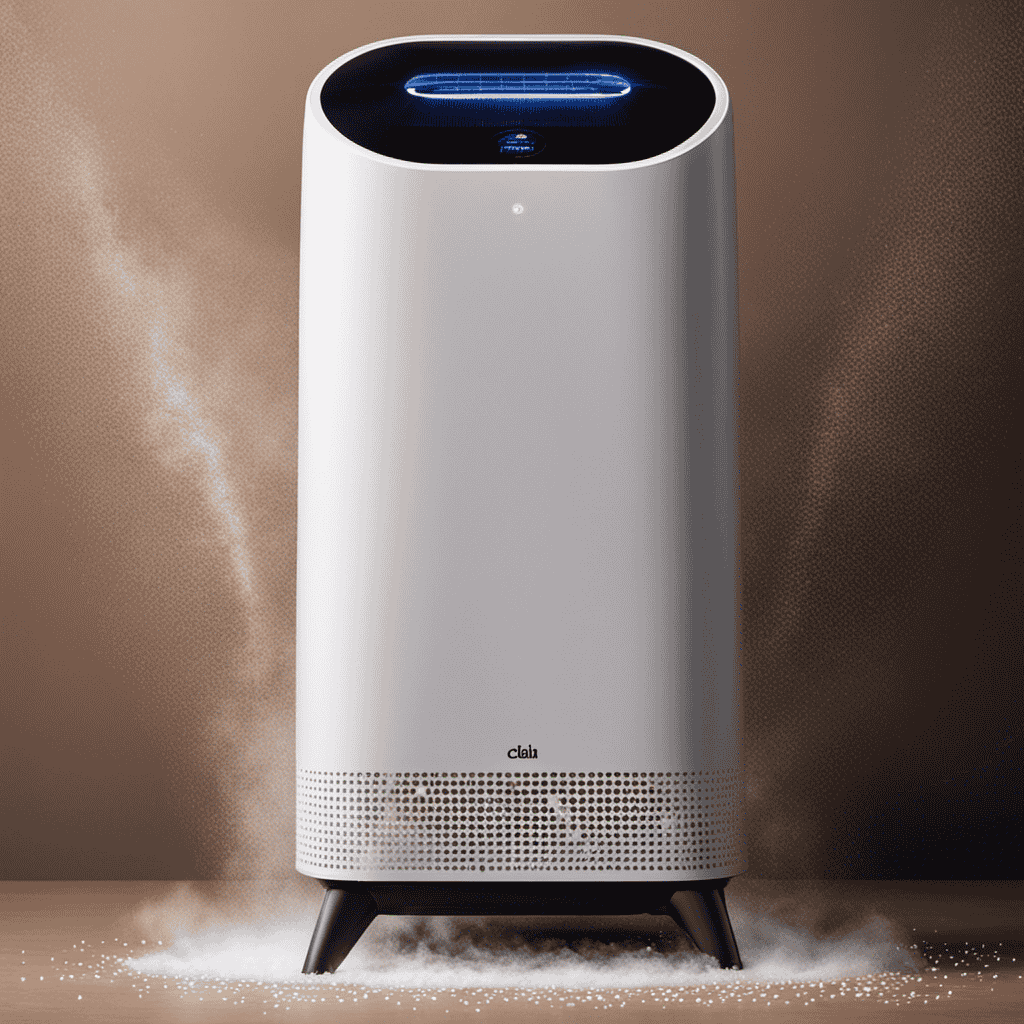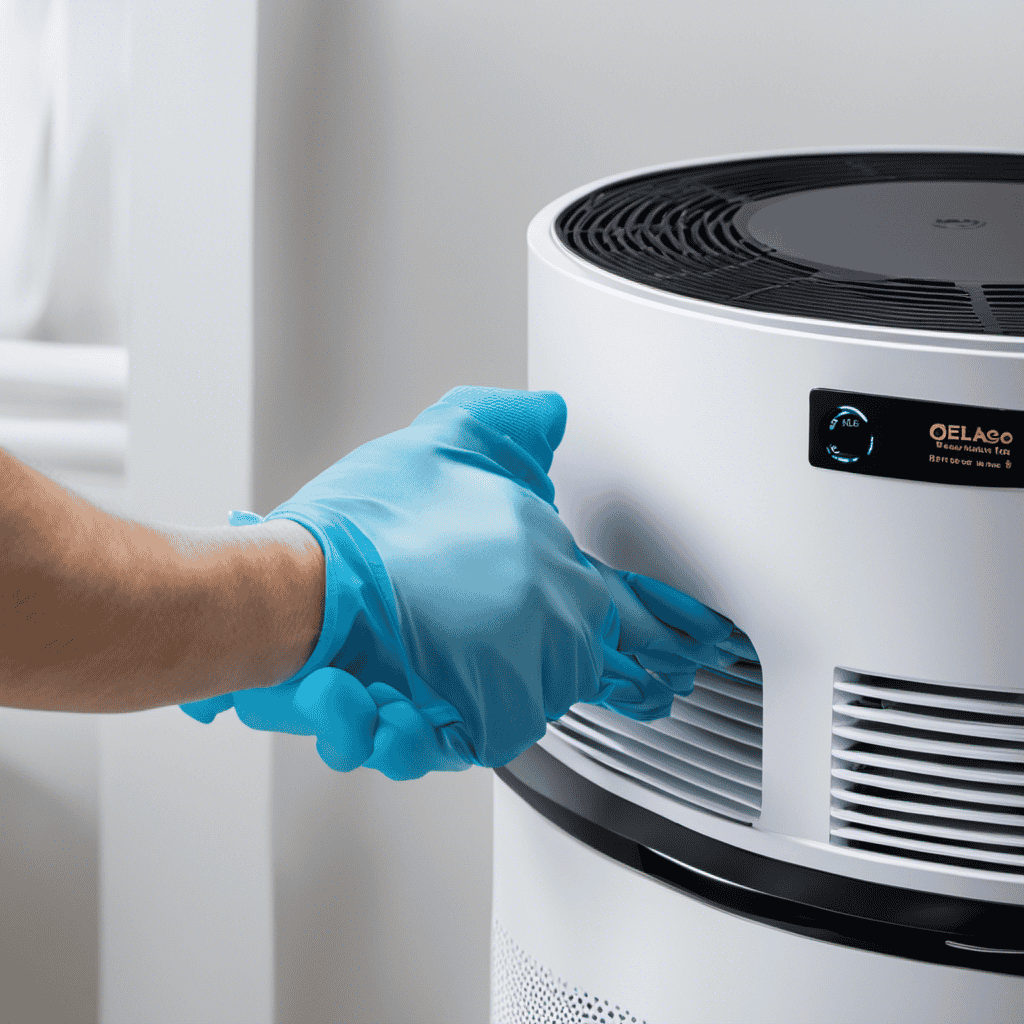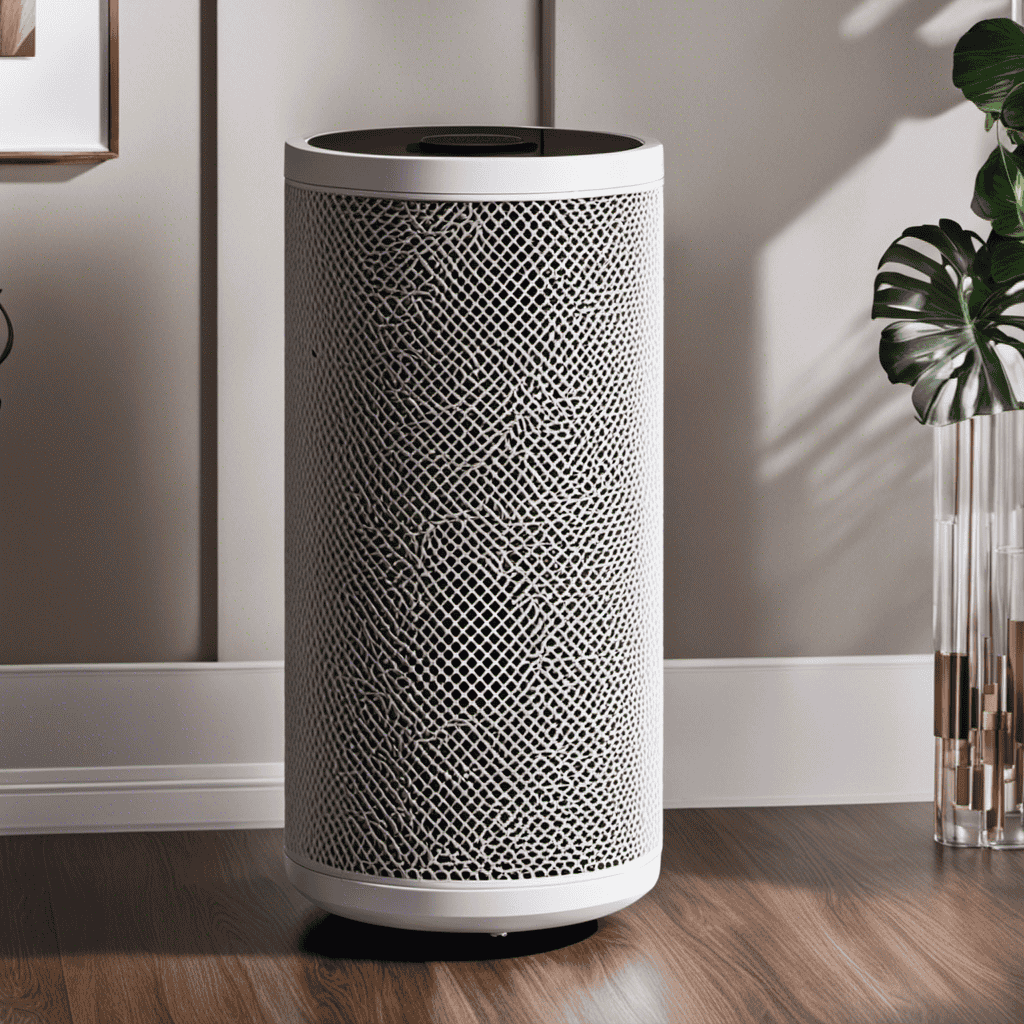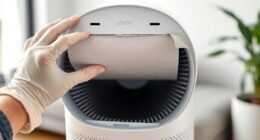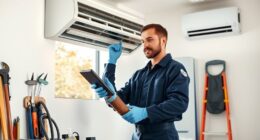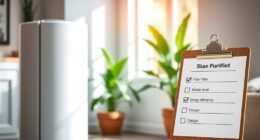Have you been informed that regularly replacing the air filter in your Dyson air purifier can greatly enhance the air quality in your household?
As the proud owner of a Dyson air purifier myself, I understand the importance of this simple yet essential maintenance task.
In this article, I will guide you through the process of determining when and how often you should replace your Dyson air filter.
So, let’s dive into the world of air filtration and ensure that your Dyson purifier continues to provide you with clean and fresh air.
Key Takeaways
- Regular air filter changes maintain the effectiveness of your Dyson air purifier.
- Dirty filters can result in reduced airflow and decreased filtration efficiency.
- The recommended frequency for changing the air filter is every 6 to 12 months.
- Reduced airflow, musty odor, and dust buildup indicate a clogged filter that needs to be replaced.
Understanding the Importance of Regular Air Filter Changes
You should make sure to change your air filter regularly because it helps maintain the effectiveness of your Dyson air purifier.
The importance of clean air cannot be overstated, especially in today’s world where pollution is a major concern. By regularly changing your air filter, you ensure that the air purifier is able to remove harmful particles and pollutants from the air effectively.
A clean air filter also helps to improve the overall air quality in your home, reducing the risk of respiratory issues and allergies. Additionally, regular air filter changes can prolong the lifespan of your Dyson air purifier, as a clogged or dirty filter can put strain on the machine and lead to decreased performance.
Investing in regular air filter changes is a small price to pay for the numerous benefits it provides in maintaining clean and healthy air in your home.
The Role of Air Filters in Dyson Air Purifiers
When it comes to the filter replacement frequency in Dyson air purifiers, it is crucial to understand the impact of dirty filters. As a user, I have found that regularly changing the air filters is essential to maintain optimal performance and ensure clean air quality.
Neglecting to replace dirty filters can result in reduced airflow, decreased filtration efficiency, and ultimately, compromised air purification.
Filter Replacement Frequency
The recommended frequency for changing the air filter in a Dyson air purifier is typically every 6 to 12 months. Regularly replacing the air filter is of utmost importance in maintaining clean air and maximizing the performance of your Dyson air purifier.
Here are the benefits of regular filter changes:
-
Improved air quality: A clean air filter ensures that harmful pollutants, allergens, and airborne particles are effectively trapped, resulting in cleaner and healthier air for you and your family.
-
Enhanced system efficiency: A clogged or dirty filter can restrict airflow, causing the air purifier to work harder and consume more energy. By regularly replacing the air filter, you can ensure optimal performance and energy efficiency.
-
Prolonged lifespan of the air purifier: Regular filter changes prevent the accumulation of dirt and debris, which can damage the internal components of the air purifier. This helps extend the lifespan of your Dyson air purifier, saving you money in the long run.
Impact of Dirty Filters?
Regularly replacing a dirty filter can significantly improve the air quality in your home and increase the efficiency of your air purifier. Dirty filters can have a detrimental impact on the overall performance of your air purifier. When the filter becomes clogged with dust, pet dander, and other airborne particles, it restricts the airflow and reduces the purifier’s ability to effectively capture and remove pollutants from the air. This can lead to decreased air quality and an increased risk of respiratory issues.
Regular filter changes, on the other hand, ensure that your air purifier is operating at its optimal level, removing pollutants and allergens effectively. By maintaining clean filters, you can enjoy cleaner air and a healthier living environment.
Now, let’s explore the signs that indicate your Dyson air filter needs to be replaced.
Signs That Your Dyson Air Filter Needs to Be Replaced
If you notice reduced airflow or a musty smell, it’s time to replace your Dyson air filter. Clogged filters can significantly impact the performance of your air purifier and compromise the quality of the air you breathe.
Here are some signs that indicate your Dyson air filter needs to be replaced:
-
Decreased Airflow: If you feel that the airflow from your Dyson air purifier has decreased, it may be due to a clogged filter. As the filter becomes dirty and filled with debris, it restricts the passage of air, leading to reduced airflow.
-
Musty Odor: A musty smell coming from your air purifier is a clear indication of a clogged filter. When the filter is unable to trap and neutralize odors effectively, it can result in a lingering musty smell in the air.
-
Dust Buildup: If you notice an accumulation of dust particles around your air purifier, it suggests that the filter is not effectively capturing and trapping airborne particles. This dust buildup is a sign that your filter is clogged and needs to be replaced.
Regularly replacing your Dyson air filter is crucial for maintaining the efficiency and effectiveness of your air purifier. Clean air filters ensure that you are breathing in fresh, clean air, free from allergens, dust, and other pollutants. By replacing your air filter when necessary, you can ensure that your Dyson air purifier continues to provide you with clean and healthy air.
How Often Should You Check Your Dyson Air Filter
Checking your Dyson air filter regularly is important to ensure its effectiveness. The frequency at which you should check your air filter depends on several factors.
Generally, it is recommended to check your Dyson air filter every 2 to 3 months. However, if you live in a dusty or polluted area, you may need to check it more frequently, such as once a month.
To check your air filter, simply remove it from the unit and inspect it for any visible dirt or debris. If you notice a significant buildup, it is time to clean or replace the filter.
Regular maintenance techniques, such as vacuuming or washing the filter, can help prolong its lifespan and maintain optimal performance.
Factors That Can Affect the Lifespan of Your Dyson Air Filter
When it comes to the lifespan of your Dyson air filter, there are several factors that can affect its efficiency and longevity. Understanding these factors can help you prolong the lifespan of your filter and ensure that it continues to perform optimally.
Here are three key factors that can impact the efficiency and lifespan of your Dyson air filter:
-
Air quality: The quality of the air in your environment can greatly impact your filter’s lifespan. High levels of pollutants, dust, and allergens can cause the filter to clog up more quickly, reducing its efficiency and shortening its lifespan.
-
Usage frequency: How often you use your Dyson air purifier can also affect the lifespan of the filter. Continuous usage in environments with poor air quality will require more frequent filter replacements compared to occasional usage in cleaner environments.
-
Maintenance: Regular maintenance, such as cleaning the filter and the unit itself, can help prolong the lifespan of your filter. Dust buildup on the filter can hinder its performance, so cleaning it regularly will ensure that it functions efficiently for a longer period of time.
Step-by-Step Guide to Changing the Air Filter in Your Dyson Air Purifier
To start, make sure your Dyson air purifier is turned off and unplugged from the power source. Changing the air filter in your Dyson air purifier is a simple process that can greatly improve the performance and lifespan of your device.
Here are some tips for prolonging the air filter lifespan and ensuring proper disposal of old air filters:
-
Regular Cleaning: Vacuum the air filter every 1-2 months to remove dust and debris. This will help maintain its efficiency and prolong its lifespan.
-
Replacement Schedule: Follow the manufacturer’s guidelines for replacing the air filter. Typically, it is recommended to replace the filter every 6-12 months, depending on usage and air quality.
-
Proper Disposal: When disposing of old air filters, it is important to handle them with care. Place the used filter in a sealed bag to prevent the release of trapped pollutants, and dispose of it according to local waste disposal regulations.
Common Mistakes to Avoid When Changing the Air Filter
When changing the air filter in your Dyson air purifier, it’s important to avoid common mistakes that could affect its performance and longevity. Here are some proper cleaning techniques to keep in mind:
-
Neglecting regular filter maintenance: Many people forget to clean or replace their air filters regularly, leading to reduced efficiency and air quality.
-
Incorrect filter installation: Improperly installing the air filter can result in air leakage and decreased filtration effectiveness. Make sure to follow the manufacturer’s instructions carefully.
-
Using the wrong cleaning method: Different filters require different cleaning techniques. Using the wrong method can damage the filter or reduce its effectiveness. Always refer to the user manual for proper cleaning instructions.
By avoiding these common mistakes and following proper cleaning techniques, you can ensure that your Dyson air purifier functions optimally and provides clean air for your space.
Now, let’s move on to discussing the different types of air filters available for Dyson air purifiers.
Different Types of Air Filters for Dyson Air Purifiers
Now, let’s take a look at the different types of air filters available for your Dyson air purifier. When it comes to air filtration, there are several filter materials to choose from. The most common and effective type is the High Efficiency Particulate Air (HEPA) filter. HEPA filters are capable of capturing 99.97% of particles as small as 0.3 microns, including dust, pollen, pet dander, and mold spores. These filters are highly beneficial for individuals with allergies or asthma, as they help improve indoor air quality by reducing allergens and pollutants. Other filter materials include activated carbon filters, which are effective at removing odors and volatile organic compounds (VOCs), and antimicrobial filters, which inhibit the growth of bacteria and mold. When selecting an air filter for your Dyson air purifier, consider your specific needs and the level of filtration required to ensure clean and fresh air in your home.
| Filter Material | Benefits |
|---|---|
| HEPA | Captures small particles |
| Activated Carbon | Removes odors and VOCs |
| Antimicrobial | Inhibits bacteria and mold growth |
Tips for Extending the Lifespan of Your Dyson Air Filter
Proper cleaning techniques, frequency of replacement, and maintenance tips and tricks are all key factors in extending the lifespan of your Dyson air filter.
When it comes to cleaning, it’s important to follow the manufacturer’s guidelines and use the appropriate tools and solutions.
Additionally, understanding the recommended frequency of replacement will ensure that your air filter is always functioning at its best.
Lastly, implementing maintenance tips and tricks, such as keeping the surrounding area clean and free from dust and debris, can further enhance the performance and longevity of your Dyson air filter.
Proper Cleaning Techniques
To maintain optimum performance, it’s important to regularly clean the air filter in your Dyson air purifier. Proper cleaning techniques can help ensure that your air purifier continues to effectively remove pollutants from your indoor air.
Here are some common mistakes to avoid when cleaning your Dyson air filter:
- Avoid using harsh chemicals or cleaning agents on the filter, as this can damage the filter material and reduce its effectiveness.
- Do not wash the filter with hot water, as this can cause the filter to shrink or become distorted.
- Make sure to thoroughly dry the filter before reinstalling it in the air purifier, as moisture can lead to mold or bacterial growth.
Frequency of Replacement
Now that we understand the proper cleaning techniques for our Dyson air purifier, let’s talk about the frequency of filter replacement.
Regularly changing the air filter is crucial for maintaining the efficiency and effectiveness of the purifier. The frequency of replacement depends on various factors such as the air quality in your area and the amount of usage.
Generally, it is recommended to replace the filter every 6 to 12 months. However, if you live in a highly polluted area or have pets, you may need to replace it more frequently.
Understanding the benefits of timely filter replacement is essential. It ensures that the purifier continues to remove pollutants effectively, providing you with cleaner and healthier air.
When it comes to choosing replacement filters, it is advisable to stick to recommended filter brands by Dyson for optimal performance and longevity.
Maintenance Tips and Tricks
One important tip for keeping your Dyson air purifier in good condition is regularly cleaning the exterior with a soft cloth and mild detergent. Proper cleaning techniques are essential for maintaining the performance and longevity of your air purifier.
Here are three key maintenance tips and tricks to follow:
-
Clean the exterior: Use a soft cloth and mild detergent to gently wipe down the exterior of the air purifier. Avoid using harsh chemicals or abrasive materials that could damage the surface.
-
Vacuum the vents: Use a vacuum cleaner with a brush attachment to remove dust and debris from the vents of the air purifier. This helps to ensure proper airflow and prevents clogging.
-
Replace the filters: Follow the manufacturer’s instructions for the frequency of filter replacement. Regularly changing the filters is crucial for maintaining the effectiveness of your air purifier.
Frequently Asked Questions About Dyson Air Filter Replacements
Have you ever wondered how often you should change the air filter in your Dyson air purifier? Understanding filter efficiency and troubleshooting filter issues are essential for maintaining clean and healthy indoor air. The frequency of filter replacements depends on various factors, such as air quality, usage, and the specific model of your Dyson air purifier.
To help you determine when it’s time to change your air filter, refer to the table below:
| Model | Recommended Filter Replacement Interval |
|---|---|
| Dyson Pure Hot+Cool | Every 12 months |
| Dyson Pure Cool Tower | Every 12 months |
| Dyson Pure Cool Desk | Every 12 months |
| Dyson Pure Cool Link Tower | Every 12 months |
| Dyson Pure Cool Link Desk | Every 12 months |
It’s important to note that these recommendations are based on typical usage and may vary depending on individual circumstances. Regularly inspecting your air filter and checking for signs of damage or clogging can also help you identify if a replacement is needed sooner. Remember, a clean and efficient air filter is crucial for optimal performance and healthier air in your home.
Frequently Asked Questions
Can I Wash and Reuse My Dyson Air Filter?
Yes, I can wash and reuse my Dyson air filter. However, it is recommended to replace the air filter regularly for optimal performance. Regular replacement ensures better air quality and prolongs the lifespan of the air purifier.
How Do I Know if My Dyson Air Filter Is Working Properly?
To ensure optimal performance of your Dyson air filter, it is important to clean it regularly. Signs of a clogged filter include reduced airflow and a decrease in air quality. Follow these steps to clean your Dyson air filter thoroughly.
Can I Use Third-Party Air Filters in My Dyson Air Purifier?
I change the air filter in my Dyson Air Purifier every 6 months. Using third-party air filters can affect the quality of air purification and may not provide the same benefits as using original Dyson filters.
How Much Does a Replacement Air Filter for a Dyson Air Purifier Cost?
I change the air filter in my Dyson air purifier every 6-12 months. Genuine Dyson replacement air filters can cost around $50, but they provide superior filtration and ensure optimal performance of the purifier.
Are There Any Warranties or Guarantees on Dyson Air Filters?
I clean and replace the air filter in my Dyson air purifier every 6-12 months. This helps maintain its efficiency and ensures that the HEPA filter continues to trap allergens and pollutants effectively.
Conclusion
In conclusion, keeping your Dyson air purifier’s air filter clean and replacing it regularly is essential for maintaining optimal indoor air quality. Neglecting to change the filter can result in decreased efficiency and potential health risks.
By understanding the signs of a clogged filter and following the recommended maintenance schedule, you can ensure that your air purifier continues to function effectively.
Remember, a fresh and clean air filter is the key to breathing in fresh and clean air. So, don’t wait any longer – go check and change your Dyson air filter today!

